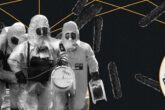Reports
Showing 1-15 of 15 Publications
-
AI and the Evolution of Biological National Security Risks
New AI capabilities may reshape the risk landscape for biothreats in several ways. AI is enabling new capabilities that might, in theory, allow advanced actors to optimize bio...
By Bill Drexel & Caleb Withers
-
Biotech Matters: Problems with Life Science Databases in the United States
While humans will retain their ultimate mysteries, many aspects of their traits, diseases, and environment are becoming increasingly tractable. Much of this advance has come f...
By Carol Kuntz
-
Biotech Matters: Public-Private Coordination of Biotechnology
An appreciation of biotechnology’s great opportunities is, for many commentators, intimately joined with regret about a disconnect between the U.S. government and the private ...
By Richard Danzig
-
Biotech Matters: Great Data Competition and Interoperability with Allies and Partners
Understanding and strengthening America’s biotechnology leadership requires exploring the limits of existing data relevant to the U.S. bioeconomy so that policymakers and the ...
By Michelle Holko
-
Autonomy and International Stability
In a time of growing international tension, with interstate warfare ongoing in Europe and openly threatened over Taiwan, military forces worldwide are looking increasingly to ...
By Tom Shugart
-
Biotech Matters: Innovation in Agricultural Biotechnology
In 1986, the United States established a “Coordinated Framework for the Regulation of Biotechnology.” In the decades since, this policy helped to enable the rapid development ...
By Dr. L. Val Giddings
-
Biotech Matters: Automated Scientists Will Power Tomorrow’s Bioeconomy
Twenty years ago, it was barely plausible that soon every person on Earth would have a supercomputer in their pocket with ready access to the world’s information. Even though ...
By Dr. David A. Markowitz
-
Biotech Matters
Operation Warp Speed showed the power of the U.S. government to direct national biotech capabilities around a shared goal—in this case, a novel vaccine. But there are many oth...
By Hannah Kelley
-
“DIU 3.0”
Rapid technological change touches virtually every aspect of life today. This includes defense and national security, and for good reason: To maintain the world’s strongest mi...
By Douglas A. Beck
-
Artificial Intelligence and Arms Control
Advances in artificial intelligence (AI) pose immense opportunity for militaries around the world. With this rising potential for AI-enabled military systems, some activists a...
By Paul Scharre & Megan Lamberth
-
Principles for the Combat Employment of Weapon Systems with Autonomous Functionalities
These seven new principles concentrate on the responsible use of autonomous functionalities in armed conflict in ways that preserve human judgment and responsibility over the ...
By Robert O. Work
-
Drone Proliferation
Executive Summary The U.S. monopoly on drones has ended. More than 30 nations already have or are developing armed drones, and at least 90 nations, as well as some non-state a...
By Elisa Catalano Ewers, Lauren Fish, Michael Horowitz, Alexandra Sander & Paul Scharre
-
Global Perspectives: A Drone Saturated Future
Drones are rapidly proliferating. Over 90 countries and non-state groups operate drones today, and even more are certain to do so in coming years.1 These actors are beginning ...
By Kelley Sayler, Ben FitzGerald, Michael Horowitz & Paul Scharre
-
A World of Proliferated Drones: A Technology Primer
Associate Fellow Kelley Sayler examines the proliferation of drones to states, non-state actors, and individuals. The report also outlines the various types of drones and what...
By Kelley Sayler
-
Robotics on the Battlefield Part II: The Coming Swarm
20YY Warfare Initiative Director Paul Scharre explores the power of robot swarms and includes specific recommendations for action to preserve U.S. military dominance in an age...
By Paul Scharre













